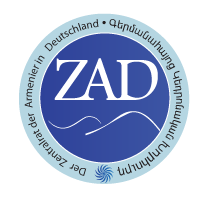YEREVAN - The Armenian Yerkir Media TV
reports that Armenian Minister of Foreign Affairs, Edward Nalbandian, did not
get on the Yerevan-Istanbul flight late this evening, after issuing a terse
response to announcements made by Turkish President Gul and Turkish Prime
Minister Erdogan that Turkey will not lift its blockade of Armenia unless
Armenia fulfils Turkish preconditions regarding the Mountainous (Nagorno)
Karabagh issue and the international recognition of the Armenian Genocide.
Responding to a question by the Interfax news agency, the Armenian Foreign
Minister said: "The establishment of Armenian-Turkish relations should be
realized without any preconditions and with that understanding we have been and
are conducting the negotiations with the Turkish side.
"The establishment of relations is not related to the resolution of the
Karabagh issue and that issue has not been discussed during the negotiations
aimed at establishing Armenian-Turkish relations.
"It has been said many times and I wish to stress again that the
establishment of Armenian-Turkish relations can not put into question the
veracity of the Armenian Genocide.
"Tens of countries and international organizations have recognized the
Armenian genocide and Armenia has hailed that recognition.
"I think that the announcements that put forward preconditions to the
establishment of Armenian-Turkish relations can be viewed as an attempt to fail
the advances registered during the negotiations," concludes Foreign
Minister Nalbandian.
The Armenian Foreign Ministry distributed Minister Nalbandian's response just
before the Armavia flight from Yerevan to Istanbul, at 23:06.
The Armenian Minister of Foreign Affairs was to attend a two-day United Nations
cultural forum in Istanbul. The Armenian Minister's now failed visit was seen by the U.S. and
Turkish media as a step towards the establishment of diplomatic relations
between Turkey and Armenia, which Turkey has refused since Armenia
gained its independence in 1991.
The Armenian Foreign Minister's derailed visit to Turkey was
to coincide with U.S. President Barack Obama's official visit to Turkey. Analysts
had pointed to the issue of the Armenian Genocide as possibly the most
challenging for the president to deal with during his talks with Turkish
officials.
On several occasions during his campaign for president, Obama had committed
himself to properly recognize the massacres and deportations of the Armenians
in the Ottoman Empire as genocide. Turkey continues to vehemently deny that there was any genocidal intent
towards the Armenians in the last years of the empire. Official Ankara spends
millions of dollars in its denial campaign, which lobbies politicians, entices
support from journalists, funds academic denial efforts, suppresses education
efforts on the Armenian Genocide to the general public in North and South
America, Europe, and the Middle East (Israel especially).
The main battlefield for genocide recognition in recent years has been the United States,
where a majority of Members of Congress support passing a resolution
recognizing the Armenian Genocide.
Turkish officials had hoped that the recent rapprochement between Turkey and Armenia can
be used as a bargaining chip to keep Obama from speaking the truth. On numerous
occasions in recent months, top Turkish officials have warned the U.S. that
interfering in discussions between Turkey and Armenia and
recognizing the genocide would be detrimental to the budding relations between Yerevan and Ankara.
Now, announcements by the Turkish Prime Minister and the Turkish President,
resetting preconditions to the establishment of diplomatic relations with Armenia and
to the lifting of the blockade have actually led the Armenia-Turkey
negotiations into a rocky road or maybe even an impasse
.
http://www.pr-inside.com/armenian-minister-of-foreign-affairs-refrains-r1164811.htm
